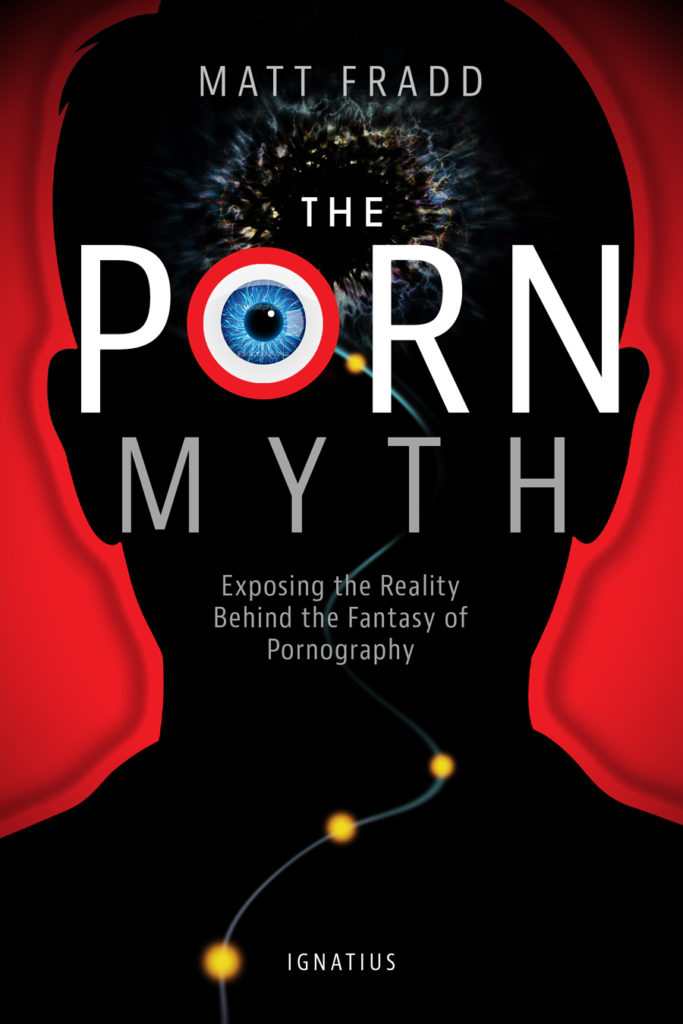
In Chapter 6 of “The Porn Myth: Exposing the Reality behind the Fantasy of Pornography,” author Matt Fradd writes, “As I wrote in the introduction, the book isn’t a religious offensive against pornography.” Though the book is published by one of the largest Catholic publishers, Ignatius Press, the word “God” does not appear in it.
For me, I like a little Jesus in my books, a little Church teaching, especially in books about important issues like pornography; it’s how we begin to understand God’s purpose for us.
Instead, Fradd goes for the psychology, the sociology, the cultural collapse caused by pornography. It’s neuroscience. Pornography stimulates the pleasure centers of the brain increasing dopamine levels, the pleasure chemical. This can cause addiction, desensitization in regular sexual intimacy and disrupt normal marriages.
What I want to know, is it a sin?
Of course it is, but why? Fradd doesn’t mention it so I feel I must.
‘The Porn Myth: Exposing the Reality behind the Fantasy of Pornography’
Author: Matt Fradd
Publisher:
Ignatius PressLength: 280 pages
Release Date: March 15, 2017
Website:
ignatius.comAvailable at: Kino Library
If we remember to consider that all human beings were made in God’s image — imago Dei — then all dignity we have is derived from Him. This dignity means that we cannot kill, injure, exploit, objectify or do anything else to violate that dignity. Pornography clearly exploits and objectifies people; it’s a multi-billion dollar a year industry.
As long as we understand, as Catholics, that violating another’s dignity in any significant way is also violating God’s will, we can get on with Fradd’s exposé.
The main premise is that the issue of pornography is surrounded by a multitude of myths, a glass house erected by an industry appealing to the worst in human nature and millennia of human rationalization on the subject. Fradd then uses statistics and studies to counter those myths.
The most important of the myths include: “porn is just ‘adult’ entertainment”, “porn empowers women”, “porn is not addictive”, “married life will cure us of all our porn obsessions” and “porn should be used as a sexual aid to enhance intimacy”.
Back to Church teaching.
Consider that we all have a nature, including a sexual one. Within God’s plan, according to Scripture and tradition, our sexuality is used to express marital love and to procreate. Our brains are hardwired for this; a balanced natural action with a proper purpose yields a balanced pleasure response. Things outside of this affect brains neuro-chemically and can cause physical changes as well. These changes can cause changes in thought, in emotions, and in the way we view intimacy and the world.
Pornography is not a victimless problem. Along with viewers, performers can be adversely affected physically and emotionally. Financial stress may cause some to enter this field and producers of pornography don’t seem to be wholly dedicated toward the safety and comfort of their performers. Manna over God.
And while we, as Catholics, consider the moral problems of pornography, those outside the faith or any faith, even secular, atheists will suffer adverse effects.
Neuro-scientists have recorded the effects. Certain fetishes — or deviations from the norm — for example, like bondage, can cause a person to desire to reenact that for sexual pleasure, and that can get someone hurt.
Thus, even while living in these postmodern times in which our feelings are sacrosanct and anything goes, pornography, as a reactive medium, simply causes unwelcome changes in the brain; same as with many illegal drugs.
Dopamine, in our own brains, is as potent as most any illegal drug. It never lasts as long but that is its own additional problem. The neuro-feedback loop with dopamine can cause a quick-building tolerance requiring more and more intensity in the experience as the necessary frequency climbs.
Ultimately, along with the moral problems, pornography strikes directly at the foundation of society: the human individual, and this directly affects family, relationships and society as a whole. The loss of values — which is what pornography causes — brought the Roman Empire down.
Again, as long as we understand Catholic teaching on this issue, we will find Fradd’s book to be informative and well worth the read.






